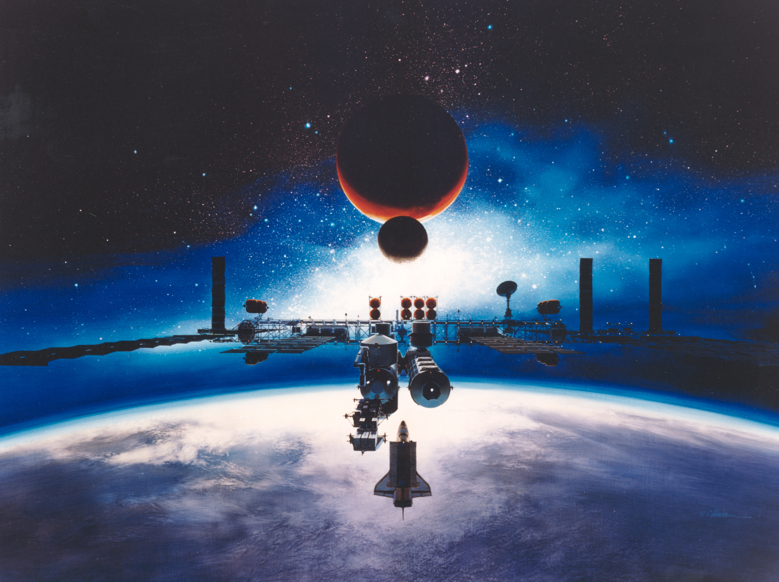What significance does symbiosis have to us as a species?
Our species has existed for thousands of years. Our experiences over these thousands of years have molded us and our beliefs as a species and as individuals.
To discard everything we have learned over the millennia would be ludicrous.
The suffering has been enormous.
Blood has covered the fields, colored the waters, seeped deep into the earth.
Wails of despair and desperation have reached to and through the very boundaries of the universe.
Tears have been so numerous they would cause the greatest floods to pale.
The sadness, fear, yearning, pleas for mercy, ... cannot be ignored.
And why is it that the negatives are the ones being stressed here?
The negatives are being stressed because it is not the wonderful, warm, and awe inspiring events we want to reduce significantly.
It is the future negative aspects and experiences of our species we want to reduce.
It is the future painful actions of our species we want to push aside in order to make room for the positive.
It is the future despair and despondence we want to squeeze into a box and set aside in order to allow the positives to become substantially dominant in our society as we drag our social presence throughout the heavens.
But what of the negatives?
The negatives have molded us and shaped us.
How can we let these go?
Aren’t we afraid we will lose what these negative experiences had to offer us if we reduce their occurrences in the future?
There has been so much pain and suffering in the past, how could it be that there is not enough to last forever?
How could it be that if all awareness becomes a part of total awareness, that there would not be enough pain and suffering for all pieces of awareness to share when these pieces are once again immersed within the total sum of awareness?
Knowing our history as a species, how could we ever believe we have not contributed more than our share of the negative?
How could we ever believe we must suffer more for the good of the whole?
Our species has suffered enough.
We may have done this through self infliction, but we have suffered it nonetheless.
It is time to move on and this can only be done through understanding where we are located and why we exist.
We are located within the Whole.
We are located within God/Brahma/The All/... (panentheism) and as such all the negatives all the suffering, all the pain remains within The All, becomes a memory of The All.
We must never forget, for we have no right to let all the suffering endured by members of our past go in vain.
We must not ignore the suffering in our past.
The only way to avoid repeating the past is to remember the past.
Our species has existed for thousands of years. Our experiences over these thousands of years have molded us and our beliefs as a species and as individuals.
To discard everything we have learned over the millennia would be ludicrous.
The suffering has been enormous.
Blood has covered the fields, colored the waters, seeped deep into the earth.
Wails of despair and desperation have reached to and through the very boundaries of the universe.
Tears have been so numerous they would cause the greatest floods to pale.
The sadness, fear, yearning, pleas for mercy, ... cannot be ignored.
And why is it that the negatives are the ones being stressed here?
The negatives are being stressed because it is not the wonderful, warm, and awe inspiring events we want to reduce significantly.
It is the future negative aspects and experiences of our species we want to reduce.
It is the future painful actions of our species we want to push aside in order to make room for the positive.
It is the future despair and despondence we want to squeeze into a box and set aside in order to allow the positives to become substantially dominant in our society as we drag our social presence throughout the heavens.
But what of the negatives?
The negatives have molded us and shaped us.
How can we let these go?
Aren’t we afraid we will lose what these negative experiences had to offer us if we reduce their occurrences in the future?
There has been so much pain and suffering in the past, how could it be that there is not enough to last forever?
How could it be that if all awareness becomes a part of total awareness, that there would not be enough pain and suffering for all pieces of awareness to share when these pieces are once again immersed within the total sum of awareness?
Knowing our history as a species, how could we ever believe we have not contributed more than our share of the negative?
How could we ever believe we must suffer more for the good of the whole?
Our species has suffered enough.
We may have done this through self infliction, but we have suffered it nonetheless.
It is time to move on and this can only be done through understanding where we are located and why we exist.
We are located within the Whole.
We are located within God/Brahma/The All/... (panentheism) and as such all the negatives all the suffering, all the pain remains within The All, becomes a memory of The All.
We must never forget, for we have no right to let all the suffering endured by members of our past go in vain.
We must not ignore the suffering in our past.
The only way to avoid repeating the past is to remember the past.

 RSS Feed
RSS Feed